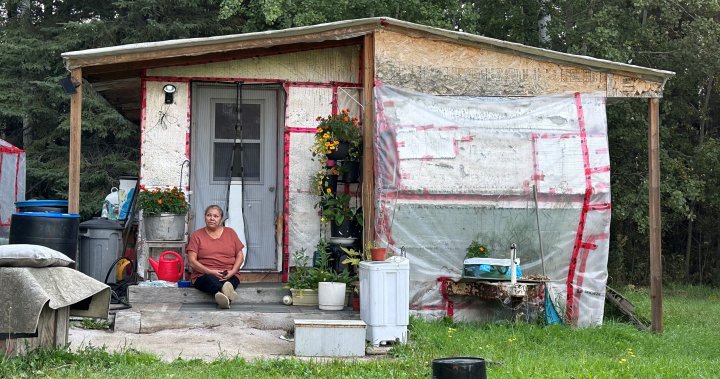The small hamlet of Conklin in northeastern Alberta has a close-knit community of around 200 residents who value their deep Metis roots and connection to the land. Despite the lack of amenities in the area, many residents, like Grace Richards, choose to live in Conklin because it is their family home with cherished memories. However, finding adequate housing in the remote region has been a challenge for many residents due to the high cost of building and lack of rental options. Richards herself has been living in a small camper with minimal facilities, making do with the limited resources available to her.
Due to the housing crisis in the community, many residents are living in overcrowded and dilapidated homes, with some resorting to couchsurfing to find a place to stay. Val Quintal, part of the Conklin Housing Initiative, reports that a study from 2021 found 92 adults in need of housing, requiring approximately 40 new homes to address the issue. In response to this crisis, Cenovus, an Alberta energy company operating in the area, has committed $50 million to build 200 homes in six Indigenous communities near its oilsands operation sites, including 21 in Conklin. This initiative aims to address the urgent housing needs of the community and improve living conditions for residents.
Both Grace and Darlene Richards have qualified for new homes through the housing initiative, based on a points system that considers need and current quality of life. The sisters were thrilled to see inside some of the new prefabricated homes for the first time, expressing gratitude and excitement at the prospect of moving into a more comfortable and stable living environment. The new homes come equipped with modern amenities such as power, plumbing, and running water, providing a significant improvement in their living conditions. The first phase of residents is expected to move into their new homes before the end of the year, marking a positive step towards addressing the housing crisis in Conklin.
Despite the challenges of living in temporary and inadequate housing, residents like Darlene Richards maintain a positive outlook and make the best of their situation. Darlene shares her living space with her adult daughter, ensuring that everything is tidy and organized, even in the limited space available. She reflects on the hard work required to maintain her living situation, including hauling wood in the winter and taking care of basic necessities with limited resources. However, she acknowledges that this lifestyle is all she has known and remains resilient in facing the challenges that come with it.
The housing initiative led by Cenovus in collaboration with Indigenous communities aims to not only provide new homes but also to support residents in maintaining the homes in the long term. The initiative involves a collaborative effort between Cenovus, the communities, and Indigenous Services Canada to address the infrastructure and lot development needs, with the funding for the homes coming solely from Cenovus. The responsibility for maintenance of the homes will be shared between the company and the communities, ensuring that residents have a sustainable and supportive housing solution for the future. This comprehensive approach to addressing the housing crisis reflects a commitment to improving the quality of life for residents in Conklin and other Indigenous communities in the region.
In conclusion, the housing crisis in Conklin highlights the challenges faced by residents in accessing adequate and affordable housing in remote Indigenous communities. The initiative by Cenovus to build new homes in collaboration with Indigenous communities is a positive step towards addressing this issue and improving living conditions for residents like the Richards sisters. The new homes will offer modern amenities and a stable living environment, providing comfort and security for residents who have long struggled with inadequate housing options. By working together with community members and Indigenous organizations, the initiative reflects a commitment to supporting sustainable housing solutions and creating a better future for residents in Conklin and other Indigenous communities in northern Alberta.


